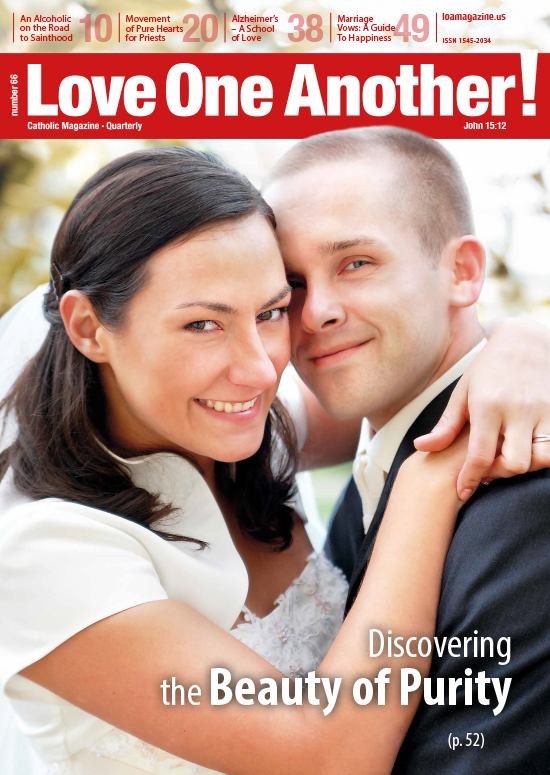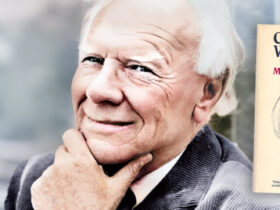Two Paths

We have a choice of two paths: one that leads to the fullness of life in heaven and the other that leads to death everlasting in hell. It is up to us which of these paths we will take. “Before a man are life and death, and whichever he chooses will be given to him” (Sir 15: 17).
The path of sin that leads to eternal damnation does not require special effort. Many people take it, since it is easy and relatively painless. On the other hand, the path of fidelity to the Commandments and the Gospel, which leads to perfect happiness in heaven, is narrow, demanding constant struggle with the powers of evil as well as unrelenting effort in overcoming one’s sins, selfishness, sloth, and all manner of temptation. Walking the path of the Commandments requires hard work. That is why there are few who pursue it consistently (cf. Mat 7: 13-14).
“Woe to those who call evil good and good evil” (Is 5: 20)
Man is a free agent. He can reject God and His Commandments. He can decide for himself what is good and what is evil. He can call evil good and good evil. Many today reject the Sixth and Ninth Commandments. Many reject Christ’s teaching on human sexuality, accepting premarital and extramarital sex, pornography, masturbation, petting, homosexual activity, contraception, abortion, in vitro methods, etc.
To such people God addresses His terrible “woes”: “Woe to those who call evil good and good evil” (Is 5: 20); “Woe to those who decree iniquitous decrees, and the writers who keep writing oppression” (Is 10: 1); “Woe to the world for temptations to sin!” (Mat 18: 7).
God tells us clearly and without equivocation: “Do you not know that the unrighteous will not inherit the kingdom of God? Do not be deceived; neither the immoral, nor idolaters, nor adulterers, nor homosexuals, nor thieves, nor the greedy, nor drunkards, nor revilers, nor robbers will inherit the kingdom of God” (1 Cor 6: 9-10).
Dismissing and trivializing sins of impurity is exceedingly dangerous. Lack of conversion, remaining in the sin of pornography and other sins of impurity—these dehumanize man. They deepen his selfishness, destroy his capacity for love, and dispose him to the powers of evil. If the sinner does not convert, such a life will surely bring on the worst misfortune of all, which is the appalling reality of hell.
“As you sow, so shall you reap” (Gal 6: 7)
Eternal damnation is that state of absolute selfishness to which we steadily advance when we reject God’s Commandments and live as if He did not exist. Every freely and deliberately committed sin entrenches us deeper in selfishness, destroying our aptitude for love. When sin totally destroys our capacity for love, when we become outright egotists, then we will despise and reject God’s saving love at the moment of death. That is what hell is. Saint Paul warns us: “God is not mocked, for whatever a man sows [here on earth], that he will also reap [in the afterlife]. For he who sows to his own flesh will from the flesh reap corruption; but he who sows to the Spirit will from the Spirit reap eternal life” (Gal 6: 7-8).
Jesus desires to bring us all to perfect happiness in heaven. Through His death and resurrection, He forgave us our sins and embraced us in the almighty power of His Mercy. If we call our sins by name, acknowledge them to Jesus with deep sorrow and a resolve to make amends, we will experience the miracle of Divine Mercy—the forgiveness of all our sins.
But we can scorn God’s Mercy. Outright rejection of Christ’s mercy is called the sin against the Holy Spirit. This sin cannot be forgiven, since it is we ourselves who radically reject God’s Mercy and any possibility of conversion (cf. Mat 12: 31-33).
Everlasting hell is thus the fruit and consequence of our entire earthly life during which we have surrendered ourselves to the powers of darkness. Thus God warns us: “Do not invite death by the error of your life, nor bring on destruction by the works of your hands” (Wis : 12).
During her apparitions at Fatima, our Blessed Mother reminded us that our greatest tragedy and misfortune is sin, and remaining in sin, which leads to the total rejection of God—i.e. hell. Those who freely and deliberately surrender themselves to the various sins of impurity (pornography, premarital and extramarital sex, homosexual acts, masturbation, etc.), and scorn God’s Mercy, walk the way to everlasting destruction. Their eternal destiny—salvation or damnation—may then depend for the last time upon the decision they make at the moment of their death. “God’s Mercy,” writes Saint Faustina, “sometimes touches the sinner at the last moment in a wondrous and mysterious way. Outwardly, it seems as if everything were lost, but it is not so. The soul, illumined by a ray of God’s powerful final grace, turns to God in the last moment with such a power of love that, in an instant, it receives from God forgiveness of sin and punishment, while outwardly it shows no sign either of repentance or of contrition, since [by that stage] souls no longer react to external things. How beyond comprehension is God’s mercy! But—horrors!—there are also souls that voluntarily and consciously reject and scorn this grace! Although a person is at the point of death, the merciful God gives the soul that interior vivid moment, so that if the soul is willing, it has the possibility of returning to God. But sometimes, the obduracy in souls is so great that they consciously choose hell; they render useless all the prayers that other souls offer to God for them and even the efforts of God Himself” (Diary, 1698).
The Movement of Pure Hearts
We cannot at once be Christians and have a pagan mindset, i.e. accept abortion, euthanasia, in vitro methods, contraception, divorce, homosexual behavior, premarital and extramarital sex, pornography, masturbation, and other like sins, which are contrary to Christ’s revealed truth about human sexuality. Christ revealed to us that every human person has infinite value and dignity. Man is created in the image and likeness of God and may never reduce his body to the level of an object that can used and viewed with lust. Man is called to love—to the unselfish gift of himself. This gift needs to be expressed in every dimension of human life. First of all, it needs to be expressed in the total gift of ourselves to God, as a natural response to His total gift of Himself to us. Next, this gift needs to be expressed in authentic love of our neighbor—including our enemies.
Inscribed also into this logic of disinterested self-giving is human sexuality. God intended sex to be the seal of the sacrament of matrimony. In the sacrament of marriage, Christ entitles a man and a woman to engage in sexual relations. Through this sacrament, Jesus consecrates the woman and the man, uniting them in an inseparable community of man and wife, and, so long as they remain in a state of sanctifying grace, enables their sexual union to be a source of mutual sanctification, an experience of their mutual love in that of God.
In order to experience this love, the couple need to have pure hearts and mastery over their desires and feelings. Only free persons with pure hearts can love. Only they can make an unselfish gift of themselves. Achieving such maturity of love should then be the supreme task of every person. Only with a free and pure heart can we love authentically. A pure heart is the gift of Christ. But we need sincerely to desire this gift, to give ourselves over to His cure in His “clinic of pure hearts” and constantly to work on ourselves.
Jesus invites everyone to undertake this supremely compelling adventure of growing in love in the community of the Movement of Pure Hearts.
Who can join the Movement of Pure Hearts? Anyone who is willing to entrust his heart to Jesus for healing. who desires to work on himself and learn from Him how to love with a pure heart.
What does it require of us? A sincere readiness to carry out all the promises expressed in the MPH Prayer of Consecration.
When can we join the Movement of Pure Hearts? Any time at all! You have only to make a sacramental confession and, after receiving Jesus in Holy Communion, give yourself totally to Him by saying the followed Prayer of Consecration:
Lord Jesus, I am thankful that You love me with a love that rights the greatest wrongs and heals the most hurtful wounds. I offer You my memory, my mind, my soul, my body, my sexuality. I pledge not to engage in sexual acts until I am united with my spouse in the Sacrament of Marriage. From this day forth, I will not read, buy, or look at pornographic materials. [Here, girls may wish to add: I pledge to dress modestly and in no way to arouse lustful thoughts or desires in others.] I solemnly promise to meet You every day in prayer, scriptural meditation, frequent reception of Holy Communion, and Adoration of the Blessed Sacrament. I also pledge to avail myself regularly of the Sacrament of Penance, not to give in to discouragement, and to pick myself up promptly every time I fall into sin. Dear Jesus, teach me the practice of self-discipline and to control my sexual desires and feelings. Give me the courage to resist the easy way in my daily walk through life. Help me to avoid everything that weakens and enslaves the will, be it nicotine, alcohol, or drugs. Teach me to place love at the very center of my life. Mary, my Mother, guide me in my journey of faith. Lead me to the very source of Love—to Jesus, that I may trust and believe in Him alone. After the example of Blessed John Paul II, I desire to entrust myself entirely to you: Totus Tuus, Mary! Blessed Caroline, procure for me the gift of a pure heart. Amen!
Entrust yourself every day to Jesus by saying this prayer. Entrust your whole self: “my memory, my mind, my soul, my body, my sexuality.” Jesus must be your one Lord and Savior, the greatest love of your life. By giving yourself to Him as his exclusive possession, you will allow Him to fill your heart with His sanctifying grace and all the graces you need in order to live like a true human being. This total offering of yourself is also a pledge to live your life in accordance with the Commandments and the Gospel, since “this is the love of God, that we keep his commandments” (1 Jn 5: 3).
Consequently, in the Prayer of Consecration, you make concrete promises to discipline your life and introduce such order into the program of your daily activities as to enable Jesus to enter your heart and build up your character with your active cooperation. Your pledge to break with pornography and not to engage in sexual activity until you enter into the sacrament of marriage is especially important. This is a concrete way of opening your heart to the demands Jesus places on you. You must simply decide, by an act of the will, to despise any kind of impurity that appeals so strongly to the senses and feelings.
The pledge to pray daily is of supreme importance. Prayer is as necessary for us as is food and oxygen, so that we can function normally and live in accordance with our dignity as human beings. Without prayer we die spiritually, since then we lose contact with God and eternal life. Prayer need not depend on our feelings and moods. We need to pray daily at regular times in the day. When disinclination to prayer arises, we need to allot even more time to being one-on-one with Jesus and Mary.
In helping us to mature into love, the “clinic of pure hearts” assigns pride of place to meeting with Christ in the sacraments of penance and the Eucharist. That is why we pledge to go to confession regularly, attend Mass as often as possible, spend time in front of the Blessed Sacrament, and make a sacramental confession as soon we have committed a serious sin.
Good desires and intentions are not enough in this journey of growing in love. We need to have a daily plan, one that allots time for prayer, work, recreation, and rest. The greatest obstacle to building your character is overcoming bad habits—and this will be especially painful. For example, resolve to go to bed early (at least by 10 p.m.) and get up early (e.g. 5 a.m.).
Drastically curtail the time you spend in front of the television and on the Internet so as to enjoy more time at prayer or some form of sport. Establishing a daily plan in prayerful consultation with Jesus will bring order into your life. Every evening make an examination of conscience. Resolve to improve, and never allow yourself to get discouraged. “Woe to the faint heart, for it has no trust! Therefore it will not be sheltered” (Sir 2: 13).
Remember: nothing of great value is achieved without effort, hard work, and self-denial. Reading our triquarterly magazine Love One Another is yet another important part of the MPH program.
Inform us of the great event of your joining MPH. Send us your name, address, date of birth, and the date you decided to join our community. We in turn will enroll you in our Book of Pure Hearts and send you formational materials as well as our special blessing.
Jesus would very much like you to write down and send your testimonies to us, that you may share with others your experience of faith, your growth in faith, and struggles with sin and the powers of evil.
We remember you all in our daily prayers, and especially during the rosary and when we recite the chaplet of Divine Mercy. All my blessings!
Fr. M. Piotrowski & the LOA team






